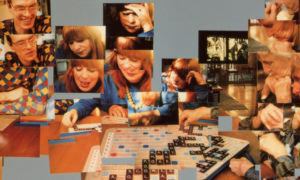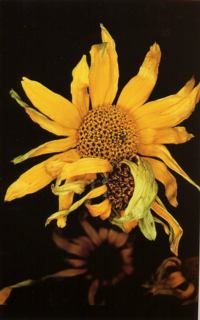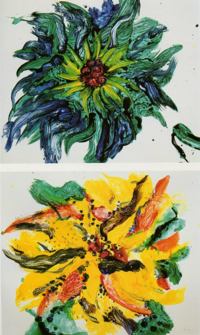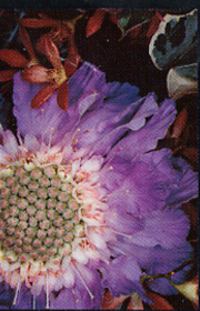
'You see, but you do not observe' remarked Sherlock Holmes to his
friend Watson in Sir Arthur Conan Doyle's novel A Scandal in Bohemia (1892).
Individual brains sort the enormous amount of visual input received every
second quite differently. What are important clues to the detective are
ignored by the rest of us. Art gives insights on how others perceive the
world and is the subject of a fascinating exhibition at the Seyagaya Museum
of Art.
How do we see through another's eyes? In the introductory room of the
exhibition are works that are the artist's records of being 'there'. They
offer the viewer a chance to walk in the artist's shoes and see what the
artist has seen. Such are the photographic snapshots of Tokyo by Yutaka
Takanashi which include images of Nezu, Nishiazabu and other suburban
areas. On an opposite wall are works by British artist Richard Long. 'Freshwater
Saltwater', was a 'line walk' by Long in Scotland in 1980. Displayed in
the exhibition is simply, a map with a line across, it marking his trek
from coast to inland lake. Another work by Long, 'Sierra Circle', uses
photography to capture an image of his footprints forming a circle on
the muddy surface of an almost dried up mountain lake in the Sierra Mountains,
California. Viewers metaphorically walk in the artist's shoes.
A room titled 'Histories', includes Ryuji Miyamoto's expressive black
and white photographs record the demolition of the Tokyo Metropolitan
Gymnasium and other historic buildings. In the center of this space, pursuing
a similar theme but with a completely different methodology, is Kimio
Tsuchiya's piece 'Loss'. Inside a large glass box made from the fragments
of windows are stacked wooden boards, seats, books, stairs, balustrades
and screens from an old Tokyo house. It is as if the entire house is packed
within itself ready for removal. Within, two old black and white TV's
continue to function. Continuing the theme are Junkichi Mukai's paintings
of old style farmhouses and rural villages. They represent his attempts
to preserve in oil paint in the 60's and 70's the rapidly vanishing rural
idyll of a bygone Japan.
Other artists in the exhibition explore photography in different ways.
David Hockney uses a mosaic of images to capture the field of vision and
time with multiple images of faces. These give the viewer an insight into
the emotions of a family-playing scrabble. Noted Japanese photographer
Nobuyoshi Araki is also featured in the exhibition with a number of works.
His images of flowers, both painted and photographed highlight the different
ways artist use mediums to capture the world.
Perception Seeing is an extensive exhibition with 11 themes and over 200
works. It presents a broad range of work in many styles. There are works
by contemporary artists such as the minimal dabs of a Lee U-Fan painting
and the gorgeous leaf sculpture of Andy Goldsworthy. There are also Nudes
painted in 1936 by Saburo Miyamoto and the realistically playful 1990
painting 'Promenade along a White Fence' by Kazuho Heida. The quirky works
of Grandma Moses (Anna Mary Robertson Moses) 'Over the bridge to Grandma's
House', 1944 and Henri Rousseau's 'View of Saint-Louis Island taken from
Saint-Nicolas Port in Evening' make interesting comparisons in the exhibition.
The emphasis is on seeing. 'Discovery' noted the Nobel Prize winning biologist
Von Szent-Gyorgyi, 'consists of seeing what everybody has seen and thinking
what nobody has thought.'



